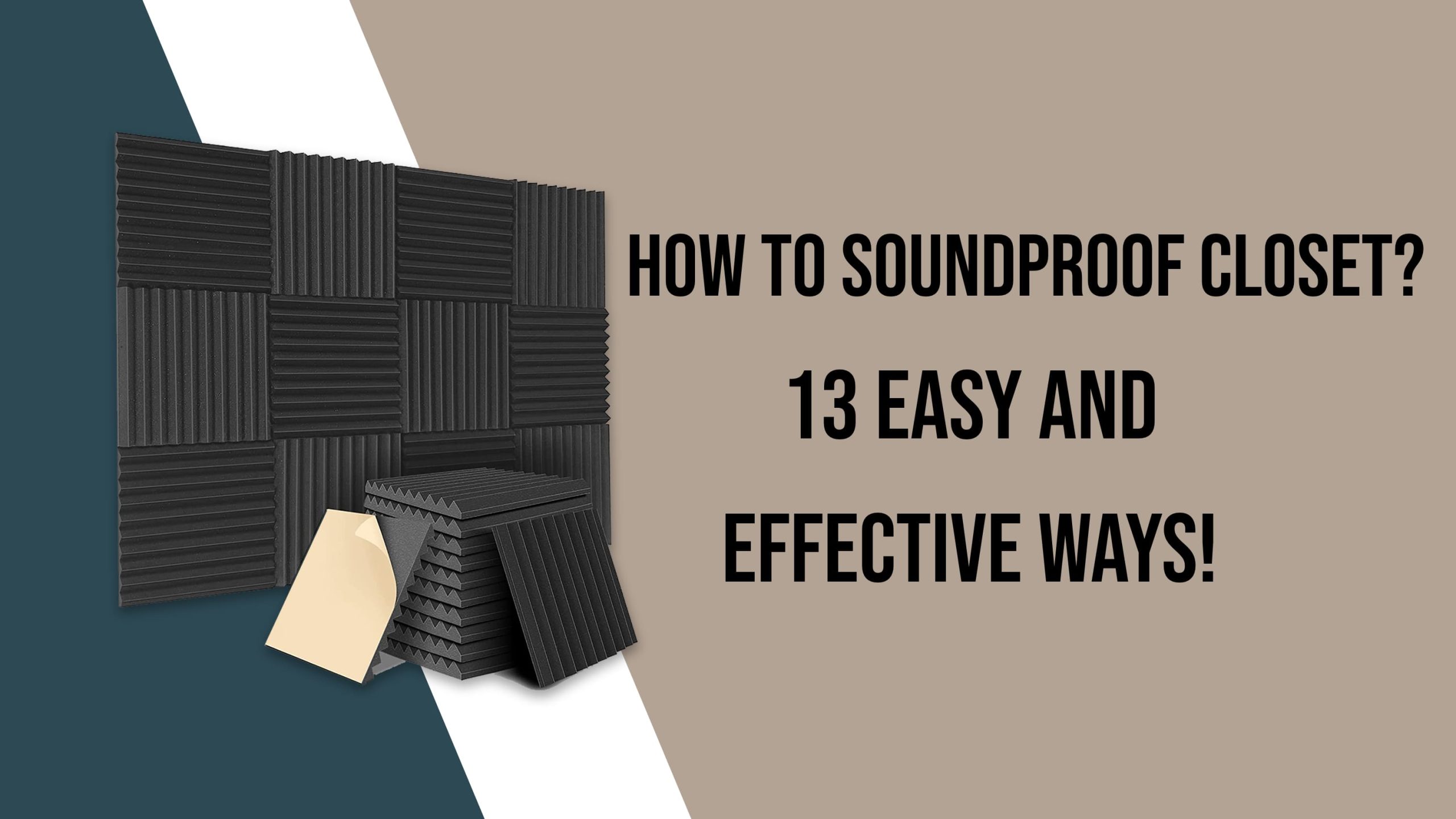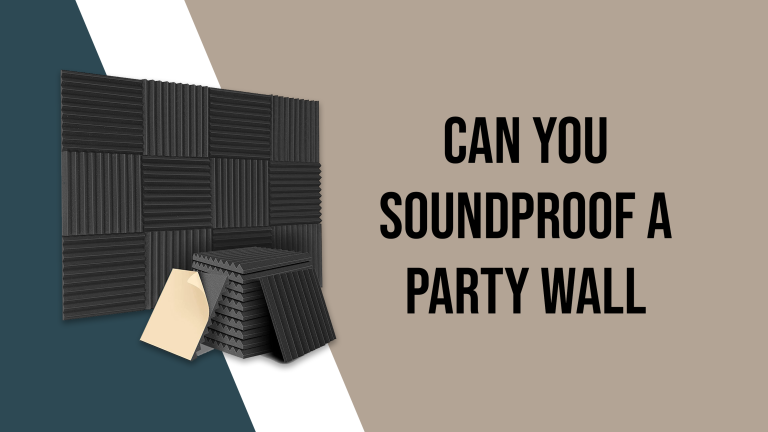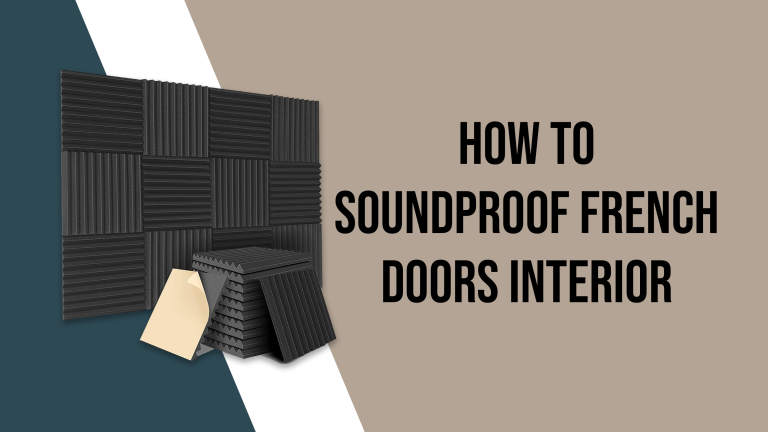How to Soundproof Closet? 13 Effective Ways with Benefits
Having a calm and quiet home is really important for feeling good. But sometimes, even the quietest places, like your closet, can get noisy. You might not think about it, but your closet can be a place where noise comes in or where noise from inside bothers you. Whether you are trying to keep your neighbor’s loud music out or just want a quiet spot for yourself, soundproofing your closet can really make a difference. Here I solve your problem of how to soundproof the closet.
The good news is that there are 13 easy and affordable ways you can follow to soundproof your closet.
Understanding the Soundproofing
Before we get into making your closet quieter, let’s discuss how sound works. Sound moves through vibrations, and to make less noise, we have to either stop or absorb these vibrations. Soundproofing is all about making walls that don’t let sound in or out. So, for your closet, we want to stop noise from getting in or out, depending on what you want.
The Benefits of Soundproofing a Closet
Having a soundproof room can make a big difference, especially when you are into music or recording sounds. It helps you make high-quality recordings without any annoying outside noise. That means your recordings will sound super clear without any disruptions. A soundproof walk-in closet can improve your daily life in many ways, especially if you live in a noisy neighborhood or work from home:
Peace and Quiet: In a noisy place with thin walls, a soundproof closet is like a calm, private place where you can escape from all the loud sounds around you. This means you can relax, and enjoy activities like watching TV, reading, or listening to music without interruptions.
Clear Communication: In a soundproof closet, you can actually hear and talk easily. It’s a great place for private chats or phone calls because there is no background noise to disturb your conversation.
Focused Work: If you work from home, using a soundproof closet as your own small office can help you focus better. It keeps out the noise from your house and the outside, so you can concentrate on your work without any interruptions.
Recording Studio: If you are a musician or make videos, a soundproof closet can become your mini recording studio. It’s a space where you can make really good audio recordings without spending a lot on professional studios.
Better Sleep: If noise keeps you up at night, a soundproof closet can be your quiet sleeping hideout. You can create a comfy corner to relax in, where noise won’t disturb you.
Privacy: Whether you need some personal time or have important work talks, a soundproof space gives you privacy. You can have secret conversations without worrying about anyone listening in.
Improved Home Office: If your home office is in your closet, making it soundproof can make your work much better. You can join online meetings, make calls, and get things done without annoying background noise messing things up.
Freelancing and Studying: If you are working or studying, transforming a soundproof closet into a study area is a best idea. It allows you focus without any interruptions, making it easy to get your work done in a peaceful environment.
Music and Content Creation: If you enjoy making music or creating content, a soundproof closet can become your own mini studio. It’s great for recording music, podcasts, or YouTube videos because it gets rid of annoying background noise and gives you really good audio quality.
Game Room: We all want a place where friends can come over to relax and have fun. If your walk-in closet is big enough, you can turn it into a game room that keeps noise inside. This way, you can play arcade games, board games, video games, or anything you like without the noise from outside causing any problems.
13 Some Effective Ways to Soundproof a Closet
Soundproofing a closet is easy and can really help reduce noise. While it might not make it super quiet, it can definitely make your place much calmer and more peaceful.
Most people ask if can i soundproof a closet. The simple answer is that soundproofing a closet is possible, which can be helpful for many reasons. Whether you want to create a quiet space for recording audio, keep loud things inside, or stop noise from going in or out, there are several effective methods to consider how to soundproof a closet cheap.
Here are some effective ways to minimize sound in and out of your closet:
Weather-stripping
Usually, the main source of sound leakage is the closet door. To reduce noise, consider adding weather stripping. You can easily add this material to the door frame to make sure the door seals tightly when it’s closed. It not only helps with soundproofing but also improves energy efficiency by avoiding drafts.
Curtains or Blankets
If you are trying to save money, you can use thick curtains or blankets to make your closet quieter. Just hang them over the closet door or on the inside walls. This do it yourself (DIY) trick helps absorb sound and reduce noise. Make sure to choose heavy, thick materials for the best results.
Soundproof Carpet
Using carpet is a simple way to make your closet quieter. Carpet absorbs noise, especially if your floors make noise when you walk on them. Carpet cushions vibrations and also reduce some of the noise from inside the closet. Soundproof carpet feels nice under your feet.
Acoustic Panels
Acoustic panels are designed to absorb sound and are commonly used in recording studios and home theaters. Putting acoustic panels on the walls inside your closet can really reduce noise. You can buy these panels or even make your own by wrapping insulation in fabric and attaching them on the closet walls.
Gaps and Cracks
Sound can easily seep through gaps and cracks in your closet’s walls. To stop this, use caulk or weather-stripping tape to seal up any gaps. Pay special attention to gaps around electrical outlets, vents, and light. These small changes can really help keep noise out.
Soft Flooring
The kind of floor in your closet can affect how well it keeps noise out. Soft materials like carpets or rugs can absorb sound and make it quieter. If your closet has hard floors like wood or tile, you can put down a thick rug to lower the noise.
Try a Reflection Filter
A reflection filter is like a curved shield that you put around your microphone. It prevents sound from bouncing back into the microphone and affecting the sound quality. It’s not exactly the same as soundproofing, but it’s excellent at reducing echo and making sound softer before it hits the closet walls.
Solid Core Door
If you can afford it, think about swapping your closet door for a solid core door. These doors are heavier and thicker than regular inside doors, so they are better at stopping noise.
Soundproofing Paint
Soundproofing paint is a special kind of paint made to stop sound from going through walls. It might not be the cheapest choice, but it is a good investment if you really want to make your closet quieter. Just put on a few coats of this paint on the closet walls for the best results.
Soundproofing Curtains
Soundproof curtains have lots of thick layers that are great at absorbing and blocking noise. You can put these curtains on your closet door or windows, and it’s a simple and nice looking way to make your closet quieter.
Add Bass Traps
Bass traps are super helpful for calming down deep, and low-frequency sounds. Whether you are using your closet for band practice or just jamming to your favorite tunes, putting in bass traps can make the sound in your space a lot better and keep everyone else at home happy too.
Bass Traps are designed to absorb sound energy. They come in various materials, including fiberglass, mineral wool, polyester foam, or acoustic foam. The commonly used type features fiberglass panels. The aim is not to completely stop the sound, but to make it softer by absorbing those troublesome waves before they reach your ears.
Rubber Flooring
Rubber flooring is a great choice when you want to soundproof your closet. It’s just like foam but made from rubber, and you can cut it to fit your closet perfectly. Rubber floors are super tough, so they work great in places with lots of people walking around or where things get moved a lot. You can use rubber flooring on all kinds of surfaces, like concrete, wood, or tile floors, and even on ceilings if you want.
HVAC Closet
A soundproof HVAC closet can help reduce the noise from your heating and cooling system. Taking care of this closet is super important.
How to Soundproof HVAC Closet?
Soundproofing an HVAC (heating, ventilation, and air conditioning) closet can significantly reduce the noise generated by the system. Here are some easy DIY steps you can take to soundproof the HVAC closet:
- Fill all the gaps: Use caulk or weather-stripping to seal any gaps around doors, windows, or vents in the closet. This will prevent sound from leaking out.
- Install a soundproof door: A specialized soundproof door that has a solid-core can also reduce the noise coming out of the HVAC closet.
- Add insulation: Insulating the walls and ceiling of the HVAC closer with dense materials like fiberglass or plywood can also reduce noise from the HVAC closet. You can also use mass-loaded vinyl or acoustic foam panels to dampen the sound in your furnace closet.
- Maintain the HVAC system: Regular maintenance and cleaning of the HVAC system can prevent it from making unnecessary noise due to mechanical issues or dirt accumulation.
How to Soundproof a Closet for Recording?
Are you someone who loves making music or podcasts and wants a quiet spot to record? You can easily turn your closet into a small recording studio with some simple steps.
Here is a guide on how to soundproof a closet for recording.
Clean Up the Mess: To begin, clear out your closet. Remove all your clothes and things to create an empty area to use. This step is important because it gives you more room for soundproofing materials and makes sure your stuff doesn’t cause any extra noise.
Soft Furnishings: Soft stuff like pillows, cushions, and blankets are great for reducing noise. Put them up on the walls inside your closet to absorb sound. You can also put a thick blanket around the closet door to create a cozy and quiet recording area.
Acoustic Foam Panels: Acoustic foam panels are made to make sound quieter. Attach these panels to your closet walls using glue or pins. They come in all sorts of shapes and sizes, so you can set up your soundproofing just the way you like it.
Heavy Curtains: Put up thick curtains on your closet door. They not only look nice but also work like a shield to stop outside noise from getting in and to keep your recorded sounds inside.
Quiet Times: To reduce outside noise, consider recording during the quietest times, such as early mornings or late evenings when there’s less traffic and fewer activities in your house.
Use a Pop Filter: If you are recording vocals, consider getting a pop filter. It’s a simple tool that stops those annoying popping sounds that come from words with P and B sounds. It makes sure your recordings sound really clean.
Quality Microphone: Having a good microphone can really improve your recordings. Choose one that fits what you are recording, whether it’s vocals, instruments, or making podcasts.
Test and Adjust: Before you get into your recording work, try some test recordings. See if there is any noise or echoes you don’t want. If needed, adjust your setup by moving things around or adding more soundproofing stuff until you get the sound quality you want.
How do I soundproof My AC Closet?
Soundproofing an AC closet is a smart move to make your indoor space quieter by reducing the noise from your AC unit.
Here is a simple guide on how do I soundproof my AC closet:
Soundproofing Materials: To absorb and block sound, consider placing soundproofing materials on both the walls and ceiling of the closet.
Some options include:
Acoustic Foam Panels: Attach these to the walls using adhesive. Acoustic foam is designed to reduce sound reflections and absorb noise.
Mass Loaded Vinyl (MLV): MLV is a heavy, dense material that is excellent at blocking sound. Hang MLV sheets on the walls or ceiling of the closet.
Soundproof Blankets: Hang heavy soundproof blankets on the walls or ceiling. These blankets are specially designed to reduce noise.
Insulate the Closet: Adding insulation inside the closet can reduce the amount of noise that passes through. You can use fiberglass or mineral wool insulation between the walls and the drywall. Make sure it fits tightly and covers all the gaps.
Soundproof the Door: The closet door can allow a lot of sound to escape. Consider replacing the door with a solid core one as they are denser and block more noise. If changing the door is not an option, use weather stripping around the frame and add a door sweep at the bottom to create a tighter seal.
Ventilation Considerations: Make sure your AC unit still gets enough air while you are soundproofing the closet. Don’t block the airflow, as this can mess up how your AC works. If your closet has a vent, think about using a special cover designed to reduce noise.
Position the AC Unit Carefully: If possible, place your AC unit on a pad designed to absorb vibrations or mount it on rubber feet that isolate vibrations. This will prevent the vibrations from causing noise on the closet walls.
How do I 100% soundproof My room?
Getting 100% soundproofing in a room is really tough and can be expensive. Soundproofing can make a big difference in lowering noise, but it’s almost impossible to get complete silence because of how sound works. The question that arises here is how to soundproof a closet cheaply. However, you can use different methods and materials to get the best soundproofing possible for your room.
Here are some steps to how do I 100% soundproof my room.
Find out Sources:
First, find out the sources of noise that you want to block. This could be external noise from traffic, neighbors, or nearby businesses, or it could be noise generated within your home, such as loud appliances or music.
Soundproof the Ceiling and Floor:
Do the same things to the ceiling and floor that you did with the walls. Use heavy materials, create gaps, and put insulation to stop noise from coming in from above and below.
Use Soundproofing Materials:
Materials such as acoustic foam, panels, and bass traps can absorb sound in the room and reduce echoes.
Electrical Outlets and Switches:
Sound can move through electrical outlets and switches. You can block it by using foam gaskets or special putty pads to seal them up.
Minimize Vibrations:
To stop heavy appliances or equipment from making noise, put them on vibration isolation mounts or pads that isolate the vibrations from the floor.
Soundproof the HVAC System:
Your heating, ventilation, and air conditioning system can be a source of noise. Make sure your HVAC ducts and vents are properly insulated. You might also want to think about using materials like acoustic duct liners or silencers to reduce noise. A soundproof furnace closet is important to maintain a peaceful and quiet living environment. Furnace closets contain heating or HVAC systems that can disturb the peace and quiet in your home.
Soundproof the Walls:
To soundproof your walls effectively, use dense materials such as drywall, MLV, or gypsum board to increase mass. Create an air gap by sound isolation clips between the current wall and the new soundproof layer. Fill the gap with acoustic insulation like mineral wool or fiberglass, and don’t forget to seal any gaps in the walls with acoustic caulk. These steps work together to significantly reduce sound transmission through your walls.
Soundproof the Windows and Doors:
To minimize noise intrusion, consider installing windows with double glazing and acoustic seals. Additionally, apply weather stripping and door sweeps to doors for better sound insulation. You can also hang thick curtains or acoustic panels over windows to further reduce outside noise in your space. These measures contribute to a quieter and more comfortable environment.
You can also read: How to Soundproof Existing Windows?
Conclusion
You don’t need to make soundproofing your closet hard or costly. With the above easy and useful ways of how to soundproof closet, you can have a quieter and calmer place to live. Whether you want to keep outside noise away or stop your closet stuff from making noise in your home, these methods can help. Keep in mind that using a mix of these ideas might work best.








